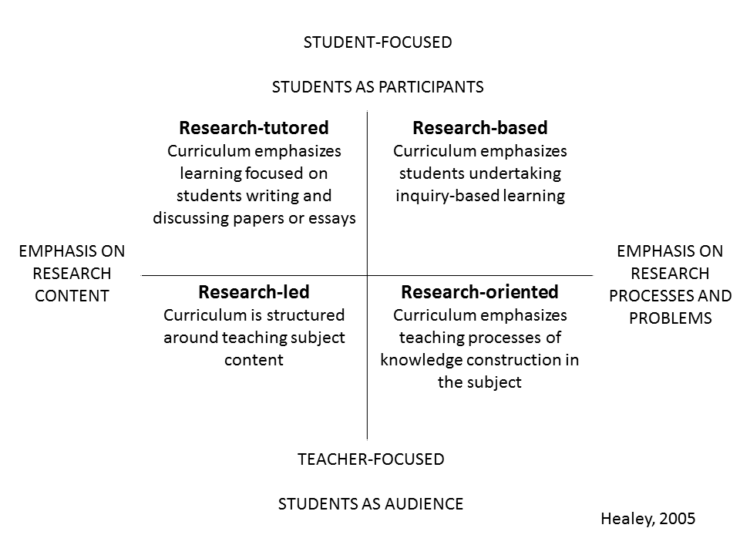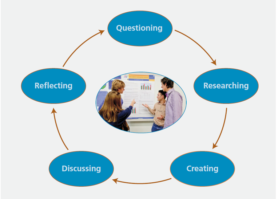Research Based Learning (RBL)
“For the students who are the professionals of the future, developing the ability to investigate problems, make judgments on the basis of sound evidence, take decisions on a rational basis, and understand what they are doing and why is vital. Research and inquiry is not just for those who choose to pursue an academic career. It is central to professional life in the twenty-first century.” (Brew 2007)
Pharmaceutical scientists need more than just theoretical knowledge and basic laboratory skills. Higher order thinking skills, and a critical attitude are important, just as research skills such as defining a (multidisciplinary) research question, develop an experimental design, critically analyse data and literature, and presenting and discussing results orally or in writing. In addition, to be able to come up with new and innovative ideas for new drugs, students have to be creative, be able to think ‘outside the box’, and recombine knowledge.
How do you teach students these essential research skills? According to the framework of Griffith (2004) teaching can be:
- Research-led: where students learn about research findings, the curriculum content is dominated by faculty research interests, and information transmission is the main teaching mode;
- Research-oriented: where students learn about research processes, the curriculum emphasises as much the processes by which knowledge is produced as learning knowledge that has been achieved, and faculty try to engender a research ethos through their teaching; or
- Research-based: where students learn as researchers, the curriculum is largely designed around inquiry-based activities, and the division of roles between teacher and student is minimised.
(Depicted from “From Research-led to Research-Based Education”- Workshop at Utrecht University 13 april 2017, Mick Healey)

This classification was used by Healey (2005) to develop a matrix showing the link between curriculum design, research and teaching. Healey suggests that only few curricula fit in one quadrant, but that most traditional university teaching takes place in the bottom left quadrant of research-led teaching. To his opinion higher education should place more emphasis on research-tutored or research-based pedagogies, as these approaches have the most benefit for student learning.
Teaching undergraduates research skills in a research-based curriculum has been shown to improve their understanding of science content, processing of scientific information and literature, critical thinking, motivation, learning, and collaboration skills. Furthermore, by performing undergraduate research students are becoming more confident to do pharmaceutical research and gain more interest in the discipline .
Research-based learning however, does not mean that students are always involved in ongoing research (for example under the guidance of a PhD student). It does imply that in courses students are actively encouraged to ask questions and solve problems.
For the College of Pharmaceutical Sciences (CPS), the research-based approach was used as the theoretical model. Inquiry Based Learning (IBL), a research-based teaching method, was chosen as the leading principle and format for the CPS.

Inquiry-based learning is driven by questions and complex problems that are open-ended and that drive the student’s need for facts, procedures and guiding principles in order to investigate and find possible answers. By engaging the students in a topic that is personally interesting to them the students will immediately be involved. The process of developing a question, performing research, creating data and discuss and reflect on the results, will stimulate students to develop a broad range of scientific skills. The students will be stimulated to creative thinking and to find practical solutions for real-life pharmaceutical problems . As the results of the inquiry can lead to further questions, and self-reflection and evaluation are central to the process.
Griffiths R. Knowledge production and the research-teaching nexus: The case of the built environment disciplines. Studies in Higher Education. 2004;29(6):709-726.
http://proxy.library.uu.nl/login?url=https://doi.org/10.1080/0307507042000287212
Healey M. Linking research and teaching to benefit student learning. Journal of Geography in Higher Education. 2005;29(2):183-201.
http://proxy.library.uu.nl/login?url=https://doi.org/10.1080/03098260500130387
Further information
“From Research-led to Research-Based Education”- Workshop at Utrecht University 13 april 2017, Mick Healey – Handout with examples and Presentation
Mick Healey, Alan Jenkins, John Lea (2014) Developing research-based curricula in college-based higher education. The Higher Education Academy, York, UK –PDF
More information about the conceptual framework of the CPS can be found in:
Irma Meijerman, Jan Nab, Andries. S. Koster (2016) Designing and implementing an inquiry-based undergraduate curriculum in pharmaceutical sciences. Currents in Pharmacy Teaching and Learning 8(6), p905-919

